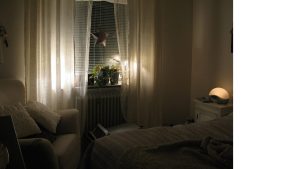Key Takeaways
- Stress puts your body in fight and flight mode. The more you are stressed the longer your body stays in survival mode.
- Long-term stress affects your deep sleep. You are unable to heal and restore even if you sleep. That causes you to wake up tired, moody and restless the next day.
- Stress and sleep deprivation work together in a vicious cycle. Bad sleep will make you more stressed, and more stress means more stress hormones are released.
- Lifestyle changes are needed to break this cycle and work your way towards a good sleep routine. You can start by creating a nighttime routine, meditating, limiting caffeine intake and making your bedroom a cozy space for yourself.

Stress can disrupt your sleep.
Let me ask you a question. Have you ever found yourself lying in bed at night, trying so hard to sleep, but unable to. You are tossing and turning, changing sides. Sometimes you turn over your pillow, sometimes you get under your quilt, sometimes you remove it. You replay old conversations, what comeback you should have given in an argument and worry over your to-do lists. Well, you are not alone, research says that 33% of adults report that stress keeps them up at night.
In this blogpost we will be discussing why you struggle to sleep at night? What does stress have to do with it? What is the relationship between stress and sleep? What are the results of poor sleep? And of course, how can you lower your stress to improve your sleep? We will also be sharing tips on how to sleep fast and to practice sleep hygiene! So, if you are interested, keep reading!
What is stress?
Let’s start at the beginning. What is stress?
According to the World Health Organization (WHO), stress is a state of worry caused by a difficult situation. It is a natural human response which exists so that we can respond to challenges and difficulties in life. This is why stress can also be good. Good stress is called eustress. However, a negative, overwhelming form of stress is the bad type of stress, and it is called distress.
How does your body respond to stress?
When your body experiences a stressful situation, it goes into fight or flight mode. This is its survival mode which prepares the body to deal with the stressful situation. The two small glands on the tops of your kidneys are activated and they release the stress hormones, adrenaline and cortisol.
Cortisol is nicknamed as your stress hormone. It works side by side with adrenaline to manage your stress response. Adrenaline increases your heart rate and the rate of respiration in your body making it more active and alert. You pupils dilate, muscles tense up, breathing quickens, and sweating intensifies. Everything happens to ensure you are ready to take action.
In the short term, the fight and flight response allows you to survive. However, just imagine what will happen to your body if it constantly remains in a state of fight or flight mode? Imagine, if your body is constantly releasing adrenaline, causing your body to always be active and alert. Even the times when you need to slow down, rest and sleep.

Long-term stress can cause exhaustion.
Stress hormones such as cortisol upset your body’s natural sleep wake cycle. Do you ever feel tired and exhausted with pain in multiple parts of your body even after sleeping for a good 8-10 hours? Why does that happen? That is because your body has more stress hormones than it needs. This brings down the quality of your sleep which makes it difficult for your body to heal and rejuvenate when sleeping. Therefore, when you wake up, you feel exhausted.
Why does sleep and REM sleep matter way more than you think?
Yes, you read it correctly. Your sleep has different cycles, non-REM and REM sleep.
The non-REM sleep comes first. It is the part where your body is shifting from wakefulness into sleep. Your heart rate and breathing rate slow down, and you enter the slow wave sleep where your body heals itself by repairing cells and tissues. Your muscles are restored to their prime health, your immune system is boosted, and all damages are taken care of. However, none of this happens if your body is stressed. In fact, when you are stressed, your body never enters this stage or spends less time in it. So, you go to bed tired and with an aching body and that is exactly how you wake up – fatigued and exhausted.
The REM or Rapid Eye Movement sleep as the name suggests is characterized by an increase in your brain activity, rapid eye movements and this is the part where you dream! Your breathing becomes irregular, and your body becomes paralyzed, unable to move during this time. In this part your emotions are processed, and your memory and learning are boosted. However, when your body is stressed, you keep waking up in between your sleep. None of the functions of REM sleep happen and you may feel irritated and anxious the following day.
A research review of multiple studies showed that major stressful life events can negatively affect sleep patterns. Furthermore, stress has been shown to reduce REM and non-REM sleep both.
Does a thing like sleep anxiety exist?
Sleep anxiety is a condition where you feel stressed out or fearful about going to sleep. You may think of this during the day and wonder why you cannot sleep at night or why you keep waking up in between. So, sleep anxiety is caused by living with chronic stress. Chronic stress negatively affects your sleep cycle, making it difficult for you to fall asleep or stay asleep. It may even cause ugly nightmares during the REM stage of sleep, further creating anxiety about sleeping.
What is sleep onset insomnia?
It is a type of insomnia where people struggle to sleep even after trying to do so for an hour or so. It may be caused by stress, anxiety or depression. It can also be because of problems with your body’s natural sleep cycle or because of poor sleeping habits such as eating right before sleeping.
How do I know if stress is affecting my sleep?
Here are a few symptoms listed below that are a result of poor sleep:
- You find It difficult to sleep even after trying for an hour.
- You wake up again and again during your sleep.
- You wake up earlier than your alarm.
- When you wake up, your body is tired and restless.
- You experience drastic mood swings and get irritable quicker.
- You may experience physical symptoms such as:
- Tight Muscles
- Clenched Jaw
- Racing Heart
- Restlessness
- Constant Anxiety
The vicious stress-sleep cycle
As we have seen, stress causes you to lose sleep and lack of sleep worsens stress.
Sleep deprivation also causes your body to release more of the stress hormone, cortisol. Research published in the Journal of Clinical Endocrinology & Metabolism showed that even some sleep deprivation leads to higher cortisol levels in the afternoon and evening making it difficult for people to do their work and tasks with focus and attention. Furthermore, if you lack good quality sleep you may feel more irritable the next day and if sleep deprivation is a chronic issue, this may develop into anxiety of depression.
The bottom line is that poor sleep brings multiple types of issues into your life whether they be physical, emotional, work or academic related. These multiple issues create even more stress in your life. And guess what, now you lie in bed thinking about all these worries and tensions, unable to sleep.

Lack of sleep and stress feed on each other.
So, you can clearly see that lack of sleep and stress are tied together in a vicious cycle. It is like a ball thrown down a hill, it keeps on speeding and catching thorns and other obstacles on its way until finally it breaks or smashes on contact with the ground. Unless an intervention is made, therefore it is crucial to manage your stress right now, if you face any of these issues.
What are the long-term risks of chronic stress related sleep issues?
Chronic stress will worsen your sleep issues and make them chronic as well. Overtime you can develop some serious health issues such as:
- Your immune system may weaken.
- You may be at risk of heart disease.
- You may be at risk of weight gain and diabetes.
- You may be at risk of high blood pressure and high cholesterol.
- You may be at risk of various mental health issues, such as anxiety, depression and mood disorders.
So, what can you do to improve the situation?
Like a lot of other solutions, you need to start taking small steps towards lowering your stress levels. Lowered stress levels will help to balance the excess stress hormones in your body. Reduced stress will bring your body out of the fight or flight response allowing you to step out of survival mode.
The following changes in lifestyle may help you lower your stress levels:
Mindfulness Meditation
The purpose of mindfulness meditation is to be fully aware of the present moment. It involves realizing and acknowledging the various thoughts, feelings and sensations that come up in your body or are felt outside the body without any judgments. So instead of excessively worrying about the future or being stuck in the past you focus on the present moment.
A study with 47 trials and a total of 3515 participants showed that mindfulness meditation created mild-moderate improvements in levels of anxiety, depression and stress.
So, try this technique any time during the day to lower stress levels or right before going to bed for a calmer sleep.
Physical exercise
According to research physical exercise leads to positive mental wellbeing and contributes to low levels of stress, anxiety and depression. In fact, engaging in any form of physical exercise whether it is a brisk walk in the park, or dancing to your favorite song, hitting the gym, or doing yoga at home is highly beneficial in reducing anxiety or stress.
Research even suggests that exercise is directly linked with improving the quality of sleep in 40 plus people who have difficulty falling asleep.
Therefore, try to engage in your favorite form of movement to keep your body stress free and to promote high-quality sleep.
Reducing caffeine and alcohol consumption
Caffeine is known to disrupt some of the hormones in your body. It leads to the release of adrenaline and stress hormone cortisol. Moreover, it stays in your system for up to 8 hours after its intake. That is why coffee makes it difficult for you to sleep on time or get good quality sleep.
While alcohol can make you drowsy pretty fast, it diminishes the quality of your sleep, making it lighter, causing more night time awakenings and as a result you wake up feeling unrested and lethargic.
Therefore, it is recommended to avoid alcohol at least three hours before bed. Moreover, caffeine should be avoided at least 6-8 hours before your bedtime.
Spending meaningful quality time with family and friends
Loneliness can also increase stress, anxiety and depression. Enriching relationships can go a long way in keeping you happy and satisfied. Therefore, they naturally promote good sleep by lowering stress.
How can I sleep fast when stressed?
While the above changes are long term and involve setting consistent routines in place, what you can try to alleviate stress in the short term is:
Deep breathing
- Lie down in a comfortable position and close your eyes.
- Breathe in slowly and focus on your breath. Keep it in your stomach for a few seconds then slowly breathe out
- Repeat this for around 5 minutes and notice the visible calmness in your mind and body.

Try deep breathing.
How to sleep fast in 5 minutes?
The military method
There is a muscle relaxation and breathing technique, known as the military method which is famous for falling asleep fast.
- You have to tighten, then relax the muscles of your entire body one by one.
- Begin with tightening your facial muscles, then letting your tongue relax
- Relax your shoulders by dropping them, and let your arms dangle loosely by your sides
- Breathe in and breathe out while relaxing your chest
- Now, relax your thighs and lower legs
- Clear your mind of thoughts. Only experience their presence gently, without being judgmental
- Imagine something of deep comfort to you, maybe a happy memory, or being at the beach listening to the gentle sounds of the waves lulling you into a deep sleep.
This method will help you sleep quickly and was developed by the US military. However, whether it puts you to sleep in 5 minutes or 2 minutes is debatable.
How can you practice good sleep hygiene?
Sleep hygiene means the practices and habits you place into your nighttime routine before sleeping which can help you sleep on time and get good quality deep sleep. Here are some tips you can follow to develop good sleep hygiene:
Stick to a sleep schedule
Your body follows routines and patterns. It has a natural circadian rhythm, or sleep cycle. Sleeping and waking up approximately at the same time each day aids in maintaining our sleep cycles. If you do this consistently your body will automatically start falling sleepy at your bedtime and you will wake up on your own on your set waking time
.
According to Sleep Foundation, irregular sleep schedules may cause poor quality sleep and increased stress and exhaustion the following day.
Develop a cozy bedtime routine

A quiet room can help too.
Again, if you consistently stick to your nighttime rituals they will act as signals for the body to start feeling sleepy. Your nighttime routine may include gentle, calming activities like:
- Taking a shower or warm bath
- Doing skincare and hair care
- Dimming the lights half an hour before bedtime
- Listen to relaxing music
Your nighttime routine will help your body slow down after a long and tiring day. Moreover, melatonin, the body’s sleep hormone will be released which will encourage a good sleep.
Make your bedroom a haven for yourself
- Make sure your bedroom or wherever you sleep is inviting, and comfortable. Try and minimize any sleep disruptions such as loud noises or lights entering the room.
- You can use heavy curtains to absorb sounds and block light from seeping into the room
- Make sure your room is tidy and smells nice and refreshing
- Check if your pillows and mattress are comfortable for you
- Sleeping in a cooler room is easier. If you can, use fans, water coolers, or air conditioning to maintain your optimal temperatures
- Keep work related things and electronic devices outside your bedroom
Avoid screens before bed
The blue light from the screens upsets your circadian rhythm or natural sleep cycle. It can trick your brain into thinking that it is still daytime making it difficult for your brain to sleep. Moreover, you may get hooked on scrolling if you are on your phone or binge-watching reels and before you know it, hours of precious sleep time would have passed.
Therefore, avoid screens at least an hour before bed.
Try avoiding late night snacking
Yes, that’s right. You may have noticed that sleeping becomes more difficult on a full stomach. That is why avoid taking meals at least 3 hours before bed. You don’t want to cause acidity and put pressure on your gut by just eating a full meal and then lying in bed.
What about professional help?
If none of these remedies at home are working for you and you are unable to break the vicious cycle of stress and sleep deprivation, you may consider getting professional help from a licensed therapist or counsellor who can offer help in teaching you ways to reduce our stress levels. Therapy can also get to the root cause of your stress and help you overcome that in your life.
Your sleep is your power: Take control today
Stress and sleep have a complex relationship. Now that you have realized the importance of high-quality sleep and the role of stress in that, it’s time to take action! Don’t worry, you don’t have to follow all the tips at once. Start by taking small steps. And slowly work towards creating a routine for yourself which works best for you.
For example, today start by going to bed 15 minutes early, or try gentle breathing exercises when you get into bed. Just small and easy steps that work for you! And if you think you need counselling, then MindCanvas has different types of counselling and therapy facilities available for you!
If you have tried any of these tips before, share your experiences in the comment section below!
And if you found this blogpost helpful, let us know and share it with more people!
